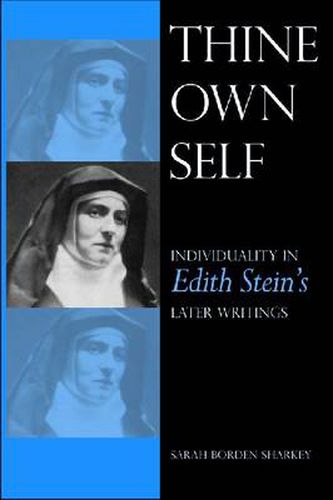Readings Newsletter
Become a Readings Member to make your shopping experience even easier.
Sign in or sign up for free!
You’re not far away from qualifying for FREE standard shipping within Australia
You’ve qualified for FREE standard shipping within Australia
The cart is loading…






Edith Stein was one of the important early phenomenologists. A German-Jewish philosopher, Discalced Carmelite nun, martyr, and saint who died in Auschwitz, Stein participated in the early 20th century revival of scholasticism and was much admired by John Paul II.
Thine Own Self
focuses on Stein’s later writings and in particular her magnum opus,
Finite and Eternal Being . Although completed in 1936, Stein’s book was not published at the time because of the new laws against non-Aryan publications, and the work sat completed but unread until after World War II. The recent availability of this book in English makes a substantive scholarly analysis of this major text particularly timely.
Thine Own Self
investigates Stein’s account of human individuality and her mature philosophical positions on being and essence. Sarah Borden Sharkey shows how Stein’s account of individual form adapts the Aristotelian-Thomistic tradition in order to account for evolution and more contemporary insights in personality and individual distinctiveness. Borden Sharkey explains how Stein’s theory of individuality and individual forms is tied to her understanding of essence and being, and she compares Stein’s distinctive metaphysical positions to those of Thomas Aquinas, John Duns Scotus, and Edmund Husserl. In addition to expositing Stein’s metaphysical positions, Borden Sharkey argues that, although Stein’s account of individual forms is both more contemporary and more adequate than John Duns Scotus’ haecceitas, it is nonetheless problematic. The book concludes by defending a more Aristotelian-Thomistic understanding of form - albeit one that must be re articulated in light of contemporary and Steinian critiques.
$9.00 standard shipping within Australia
FREE standard shipping within Australia for orders over $100.00
Express & International shipping calculated at checkout
Edith Stein was one of the important early phenomenologists. A German-Jewish philosopher, Discalced Carmelite nun, martyr, and saint who died in Auschwitz, Stein participated in the early 20th century revival of scholasticism and was much admired by John Paul II.
Thine Own Self
focuses on Stein’s later writings and in particular her magnum opus,
Finite and Eternal Being . Although completed in 1936, Stein’s book was not published at the time because of the new laws against non-Aryan publications, and the work sat completed but unread until after World War II. The recent availability of this book in English makes a substantive scholarly analysis of this major text particularly timely.
Thine Own Self
investigates Stein’s account of human individuality and her mature philosophical positions on being and essence. Sarah Borden Sharkey shows how Stein’s account of individual form adapts the Aristotelian-Thomistic tradition in order to account for evolution and more contemporary insights in personality and individual distinctiveness. Borden Sharkey explains how Stein’s theory of individuality and individual forms is tied to her understanding of essence and being, and she compares Stein’s distinctive metaphysical positions to those of Thomas Aquinas, John Duns Scotus, and Edmund Husserl. In addition to expositing Stein’s metaphysical positions, Borden Sharkey argues that, although Stein’s account of individual forms is both more contemporary and more adequate than John Duns Scotus’ haecceitas, it is nonetheless problematic. The book concludes by defending a more Aristotelian-Thomistic understanding of form - albeit one that must be re articulated in light of contemporary and Steinian critiques.